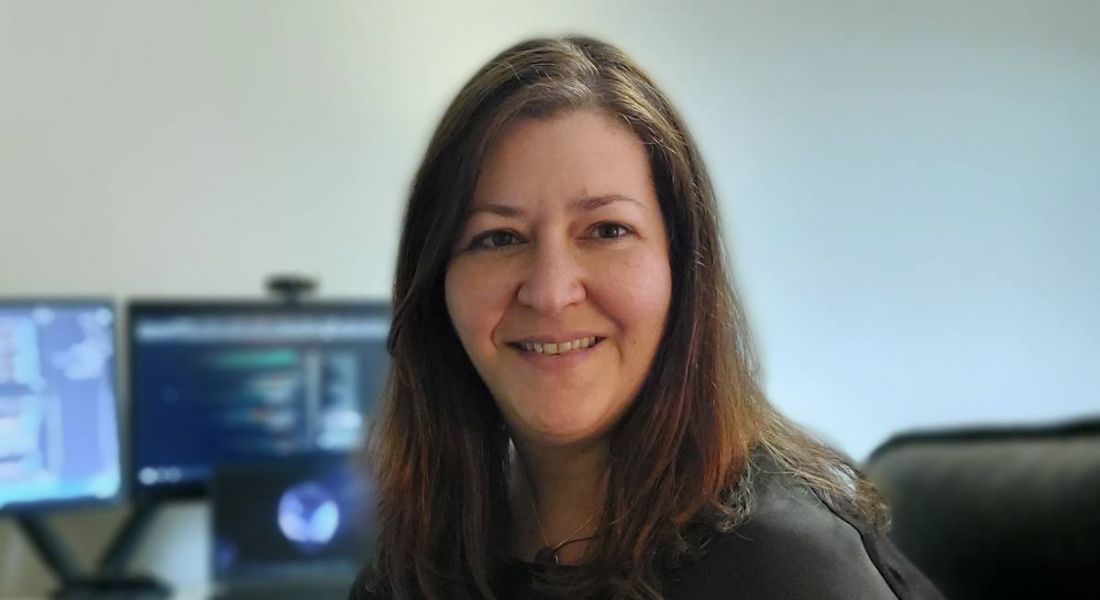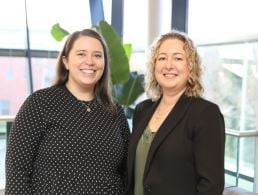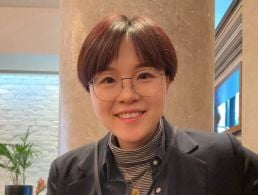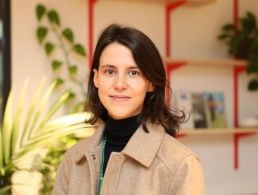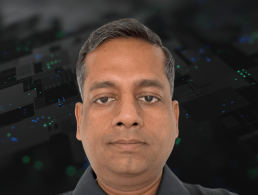Fidelity Investments’ Sumaya Almeida discusses how she ended up as a software engineer in Ireland and her experience of the FIT tech apprenticeship programme.
Before Sumaya Almeida came to Ireland, she worked as a TV producer in Brazil. During her time in this industry, she witnessed the gradual transition from analogue technologies to digital, which would later help her with her own career transition to software engineering.
Nowadays, Almeida is an associate software engineer at Fidelity Investments, where she works in developing web applications for the company’s Workplace Investing business unit. Her day-to-day work involves coding the layout, style and functionalities of the visual elements of web applications, while also ensuring that the functionality and accessibility of applications stays consistent across different devices and screen sizes.
Here, she talks to us about her career journey to date, including her switch from Brazilian TV to Irish software engineering, and how she got her start with Fidelity through the Fastrack into IT (FIT) tech apprenticeship programme.
‘Transitioning from TV to tech felt a lot like a natural path to follow’
What working in TV like and what made you decide to move into tech?
Yes, I worked as a TV producer for more than 15 years, and I was part of many different types of TV shows. From social, cultural, games, investigative journalism and news to popular reality shows that you see on TV channels worldwide, like ‘Idols’ and ‘Farmer Wants a Wife’. Working for the TV industry also involves a lot of technology.
When I started in the late ’90s, all the equipment was still analogical, and learning about how to operate all those machines, cameras, lighting set-ups and editing switchers wasn’t something very common for women. It took me a few years and a lot of perseverance to get the chance to touch those buttons. With time, everything transitioned to digital, including broadcast signals and all related equipment, like cameras, videotapes that are now hard drives and video editing that now happens inside a computer.
This was a turning point for this industry. Nowadays, content is no longer centralised in the hands of the traditional media, but it is instead seen everywhere. Anyone can generate and share content online and this has changed everything. So, transitioning from TV to tech felt a lot like a natural path to follow.
What made you decide to move from Brazil to Ireland?
I am from São Paulo, in the south-east of Brazil, meaning I used to live with the Atlantic Ocean to my east and surrounded by a giant Brazil on all other sides. The closest country, Paraguay, is more than 1,000km from there. I had the opportunity to visit most of my country, especially because of my profession. But I used to feel very isolated from the rest of the world. I had the wish to experience life outside my country. And I was lucky enough as my wife Adriana also had the same spirit of adventure, and we decided to come to Europe and spend at least a couple of years there.
We came in 2014, so this year, we have completed 10 years in Europe, five in Ireland. It was and still is a huge challenge, much more difficult than I had anticipated but at the same time, very rewarding as a personal and professional experience. I had to prove myself so many times that I couldn’t count, and I passed. I am still here and still making plans and trying to be the director of my own story.
Is there anything from your career in TV that has helped you in your role as a software engineer?
Lots of things. As a TV producer, I have a lot of experience managing projects from conception to completion. Setting timelines, meeting deadlines, dealing with multiple dependencies and stakeholders. It also requires creativity and problem-solving skills every minute. I consider myself very attentive to details and that certainly comes from that time when every detail matters, costs lots of money and can make a huge difference to the result.
Having a communications background is always helpful for my role as a software engineer, because to align expectations, we will always discuss requirements and to make sure everyone is clear about project goals and priorities.
Tell me about the FIT tech apprenticeship programme and your experience with it.
FIT is a two-year programme and for the first six months, we studied in class full-time. After that, the workplace part of the programme took place, and we started coming to the workplace three days a week for a year. Finally, during the last six months, it was one day in class and four days at the workplace. We learned mostly by working on actual projects. To conclude the programme, we must also get a minimum of two industry certifications in areas of expertise you can choose from.
I learned a lot by working on real-world projects, working side by side with experienced professionals and for me, it was a life-changing experience. It is an exciting challenge as you start with very limited knowledge, but we now have so much content available online, we can learn as needed, research on various channels and apply what we’ve learned to the task we are doing. At Fidelity, I had a lot of support from our apprenticeship committee, Jump2IT, and from my manager, my colleagues and mentors. The support I received was essential to help me and other apprentices provide more values to teams.
What do you enjoy most about your current job and working in tech in general?
I enjoy coding, solving problems through code, learning new technologies and I love teamwork, especially when we are all trying to find solutions to meet requirements or discussing the best approach to a given scenario. I also enjoy the knowledge-sharing environment, learning from others and sharing what I know.
What advice would you give to someone thinking of making a career change into tech?
At first, technology may feel too much like rocket science. But as you go and break the learning into small pieces, you accumulate knowledge over time and things start to make more sense. I wish I could understand earlier that nobody knows everything (well, some do know a lot) and that it is a continuous learning process. Age is not an impediment if you are willing to put the energy in and have the aptitude.
Find out how emerging tech trends are transforming tomorrow with our new podcast, Future Human: The Series. Listen now on Spotify, on Apple or wherever you get your podcasts.
